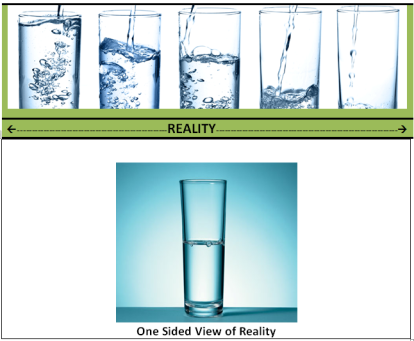If there is one thing that people hate the most, it’s the reality. Through ages, men have learned to understand reality into perceptions of good and bad. And while we do so, we bleak out a much needed, neutral, unbiased and accurate view of facts – the reality.
Let’s prove it by seeing how the metaphor half-empty or half-full glass has its reality distorted. Instead of seeing it in both sides, people falsely apply it as a litmus test for separating positive from negative thinking. Without delving deep into the nature and limitations of the metaphor, we simply mark disagreeing people into those who see glass as half-empty.
That the glass is half-full or half-empty is more of a philosophical question, not a statement to jump into conclusions or feel good, or feel bad judgments.

It totally depends on the frame of mind that you’d see things as positive and negative. While you may seemingly relate an event with positivism and hopefulness, the other person may see the opposite. Psychologists have proven this thing time and again. In a research by Craig et. al (2003), it was found that a speaker’s choice of frame (stating an object as half-full or half-empty) primarily depended on how they witnessed the object prior to being filled or emptied. If they found the glass as full before being emptied, they called it as half-empty. If they found it empty before being half-filled they saw it as half-full.
The finding should be not very different for our real world. If you have been seeing all the seemingly good things for yourself, you would find all things going against that perceived good as half-empty, negative, threatening and maybe even disastrous! Of course the reverse is true for the other side.
The half-full mindset is seldom connected two of its own facets – the responsible hopefulness and the irresponsible hopefulness. The former is almost always needed. The latter causes havoc, and maybe it’s the half-empty mindset that should have prevented one. Titanic, for example, would not have sunk had the half-full approach not followed. The same goes with other accidents, crisis and disasters.
The half-empty, half-full mindedness leaves no space for imagination. By categorically marking people, objects and events into positive and negative, we do great injustice to human equality and an everlasting beauty of seeing and doing things differently.
Reality is the glass that never fills. It is neither completely empty nor completely full. It’s all about the way we see things. The ironic reality is, however, that the half-glass empty or half-glass full rhetoric is almost always one-sidedly used.
Solutions
- Accept it.
- Go kill your teachers.


